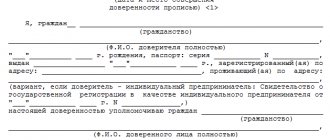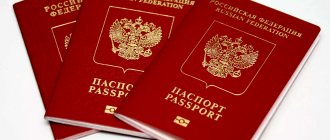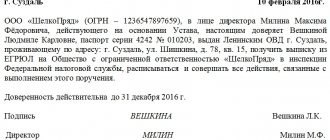A executed general power of attorney means the transfer of the largest possible amount of powers to another person.
Of course, it is more expedient to formalize some powers as separate instructions - a power of attorney to sign documents, to the tax office, to receive a pension, mail, or rent an apartment. A power of attorney for the departure of a child is always specially drawn up.
General powers of attorney include powers to manage property and represent interests in all bodies and organizations.
:
General power of attorney
What is a power of attorney
A power of attorney is a document with which you can authorize someone to perform legally significant actions.
A power of attorney is a written authority issued by one person to another person or other persons for representation before third parties.
Article 185 of the Civil Code of the Russian Federation
The one who issues the power of attorney is the principal or the principal. They can be a fully capable individual or a legally capable legal entity (several persons).
On behalf of young children, a power of attorney is drawn up by parents (legal representatives). Teenagers from 14 to 18 years old can draw up a power of attorney themselves, but within the limits of the competencies vested in them at that age.
The person to whom it is issued is a trustee or representative. This can be any adult, capable citizen(s), as well as an officially registered company(s).
The issuance of a power of attorney is a one-sided transaction. The consent of the representative is not required to carry it out. But he may not accept the power of attorney and refuse it at any time.
The actions of a representative are always actions on behalf of the principal, but in relation to third parties. He cannot make a transaction in his favor or in favor of his other principals.
Comparison
The main difference between a general power of attorney and an ordinary one is the scope of powers, which in the first case may imply the ability of the trustee to act in a variety of areas of legal relations, and in the second - as a rule, are very limited. To draw up a general power of attorney, the participation of a notary is required; to draw up a regular power of attorney, it is necessary only in cases where it is directly prescribed by law.
Having determined what the difference is between a general and an ordinary power of attorney, we will record the conclusions in the table.
Duration of power of attorney
When drawing up a power of attorney, the most important detail is the date.
A power of attorney that does not indicate the date of its execution is void.
Article 186 of the Civil Code of the Russian Federation
Without a date, it is impossible to calculate the validity period of a power of attorney. Previously, a power of attorney could be issued for a maximum of three years. This restriction has now been lifted.
If the text does not indicate the validity period of the power of attorney, then by default it remains valid for a year (Article 186 of the Civil Code of the Russian Federation).
How is it different from a simple power of attorney?
The form of a simple power of attorney differs from the general content in terms of powers. As a rule, a general agreement has an expanded list of powers for the physical party, while its simple form most often generalizes the actions of the principal. Most often, a simple form is used for one-time orders, and it can be issued for certain life situations. A simple order may have a limited period, for example, 15 days or to perform 1 critical operation within a specified period.
General rules for drawing up powers of attorney
A power of attorney is always a written document. For some, unified forms have even been developed. For example, for a power of attorney to receive material assets. In other cases, the power of attorney is simply written by hand or printed on a computer.
There are three required details.
- Date of preparation. As already noted, without it it is impossible to establish the validity period of the power of attorney. It can be indicated in the text by number or, as notaries do, in words.
- Information about the principal and representative. If a power of attorney is made between individuals, this information is usually limited to full name, dates of birth and passport details. But the absence or incompleteness of the latter is not grounds for invalidity of the power of attorney.
- Signature of the principal. A power of attorney is void without the signature of the person who issued it. If a person, due to a physical disability or illiteracy, cannot sign himself, they resort to the services of a hand-appler. For legal entities, a seal is also required.
Additional information that can be specified in the power of attorney:
- Place of compilation.
- The period for which it is issued.
- Powers of the representative.
Although it is not necessary to disclose in detail the powers of the representative, it is highly desirable. This can save you from litigation in the future. Especially if you delegate manipulations with your property to someone.
Do not hesitate to describe in detail the subject of the transaction (area, cadastral number, address, etc.) and give the representative specific instructions (for example, sell the apartment for an amount not lower than such and such).
You can also go the opposite way and limit the representative to a set of transactions that he can make (for example, any except for a pledge), or set a limit on the transaction amount (for example, if the contract exceeds a million rubles, the representative will not be able to conclude it by proxy).
Rights and obligations of the principal
There are two parties to a general power of attorney – the principal and the attorney. Everyone has their own rights and responsibilities. For the trustee they are:
- is obliged to provide the authorized person with rights (powers), indicate them, and notarize the paper;
- is obliged to provide the authorized person with the funds necessary to carry out instructions and to compensate for the material damage incurred;
- is obliged to accept all obligations fulfilled under the contract and to remunerate if this was stipulated in the conditions;
- has the right to terminate the deal at any time.
What are powers of attorney?
Depending on the scope of the representative’s powers, lawyers distinguish three types of powers of attorney.
- One-time. Issued to perform one specific action. For example, for the sale of land.
- Special. Issued to perform a number of similar actions within a certain time. An example is a power of attorney to represent interests in court.
- General (general). Issued for performing various actions, including the acquisition or alienation of property and signing documents. Such powers of attorney, for example, are received from the company by the heads of its branches.
The right to represent the interests of the organization
Powers of attorney are issued not only by individuals, but also by organizations, institutions, and enterprises.
A power of attorney issued on behalf of a legal entity gives the right to represent the interests of the legal entity in legal relations with all bodies, institutions, organizations and individuals, as well as to act in its interests and enter into various types of agreements, such as:
- purchase and sale of goods and other inventory items;
- supply of goods that are used for state or municipal needs:
- acquisition of movable and immovable property, complete property sets, enterprises of various forms of ownership;
- exchange of goods or manufactured products for other goods or products necessary for the implementation of statutory activities;
- lease of movable and immovable property;
- financial leasing;
- rental of residential and non-residential premises;
- free use of property;
- construction contract;
- performing design and survey, research, development and technological work;
- provision of services on a paid and free basis;
- transportation of goods and passengers;
- freight forwarding;
- obtaining a loan and bank loan;
- issuing a loan, trade credit;
- financing various projects under the assignment of monetary claims;
- bank deposit, including placing free funds in deposit accounts;
- opening current and card bank accounts;
- storage of inventory items;
- property and employee insurance;
- instructions;
- commissions;
- agent support;
- trust management of movable and immovable property of a legal entity, including transactions with securities;
- concessions on a commercial basis;
- simple partnership;
- guarantees for another legal entity or individual;
- assignments;
- transfer of monetary debt;
- power supply of facilities and structural divisions;
- gas supply for production needs;
- heat supply for administrative and industrial premises;
- water supply and sanitation.
Attention! In addition, the authorized representative has the right to sign and certify with the seal of a legal entity the following agreements:
- on the presentation of a bank guarantee;
- on the transfer of movable and immovable property as collateral;
- deposit;
- voluntary compensation for material and moral damage caused;
- financial assistance on a repayable and non-refundable basis.
A power of attorney gives the trustee the right to sign and certify with a seal such documents as:
- act of acceptance and transfer of work performed or services provided;
- act of acceptance and transfer of movable and immovable property;
- act of acceptance and transfer of promissory notes and bills of exchange, simple and registered shares, government bonds, other securities and documents.
A power of attorney gives the power of attorney the right to participate in:
- at all general meetings of shareholders of a legal entity;
- in general meetings of company participants.
Please note! In this case, the authorized representative has the right:
- votes taking into account all shares owned by the principal, shares in the authorized capital on all issues included in the agenda;
- introduce other issues on behalf of the principal at his own discretion;
- exercise other rights and fulfill the duties of the principal as a shareholder, participant in companies.
A power of attorney issued to an authorized person allows:
- represent the legitimate interests of the principal in arbitration courts, courts of general jurisdiction, and magistrates' courts;
- exercise powers and perform all procedural actions provided for by law that are provided to a party in a lawsuit;
- sign a statement of claim, submit it to the court, submit the dispute to an arbitration court;
- make a counterclaim;
- refuse the stated claims partially or in full;
- reduce the amount of claims;
- change the subject or basis of the claim;
- recognize the claim filed against the principal;
- enter into a settlement agreement at any stage of the legal process;
- file an appeal and cassation complaint against a court decision or ruling;
- appeal the actions or inaction of the bailiff;
- present or revoke a writ of execution;
- receive property or funds awarded to the principal.
Power of attorney
Powers of attorney are also divided into simple written and notarized. By law, powers of attorney for transactions requiring a notarial form and state registration must be notarized (Article 185.1 of the Civil Code of the Russian Federation). For example:
- Contract for the purchase and sale of real estate.
- Mortgage agreement.
- Pledge agreement.
- Marriage contract.
- Agreement on payment of alimony and so on.
If the transaction does not require the intervention of a notary, then powers can be transferred using a regular power of attorney, written by hand. Therefore, if, for example, you are required to provide a notarized power of attorney so that your grandmother can pick up your child from kindergarten, this is illegal.
There are also categories of powers of attorney that are equivalent to notarial ones. For example, issued to the military and certified by the leadership of the military unit. A complete list of such powers of attorney is specified in Article 185.1 of the Civil Code of the Russian Federation.
You can easily find a sample power of attorney of any type on the Internet. There are even designers of powers of attorney.
Let's consider the features of compiling the most typical ones.
When it comes to deal
A general power of attorney with or without the right to sell cannot be signed without the presence of a notary. Even if the document test was drawn up independently and the citizen came with it to the notary’s office. The maximum period for issuing such documents is three years. If the principal dies after signing, all transactions made thereafter on his behalf are invalid and will be annulled in court.
Under a general power of attorney, the representative receives permission to dispose of the house, rent it out or rent it, receive money for it, sell it and receive funds from the sale. The trustee does not have the right to re-register the house in his name.
It is also important that you can sell, exchange or rent out a house by power of attorney only with the simultaneous transfer of a land plot. This must also be documented.
Rights of the representative to dispose of the land under the house:
- Receiving and submitting documents;
- Requesting certificates for land;
- Carrying out the surveying procedure with topographic survey;
- Drawing up and signing contracts on behalf of the owner of real estate.
All related nuances, for example, receiving ready-made papers, a boundary plan, making payments, ordering work, also become available to the representative.
How to issue a power of attorney for a child
This power of attorney (or rather, consent to travel) will be needed if you plan to send your children to the sea with their grandparents.
Formally, such a document is required only in case of a trip abroad.
If a minor citizen of the Russian Federation leaves the Russian Federation unaccompanied by parents, adoptive parents, guardians or trustees, he must have with him, in addition to his passport, a notarized consent of the named persons for the departure of the minor citizen of the Russian Federation, indicating the period of departure and the state (states) ) which he intends to visit.
Article 20 of the Federal Law of August 15, 1996 No. 114-FZ “On the procedure for leaving the Russian Federation and entering the Russian Federation”
But in practice, such permission is often requested on trains and airports, even when traveling around Russia.
The power of attorney for traveling with a child must indicate the names and passport details of the parents and accompanying persons, as well as the full name and date of birth of the minor and the number of his identity document (birth certificate or passport). You can write where and for how long the child is going. Well, don’t forget about two other mandatory details: the date of execution of the power of attorney and the signature of the principal.
What to do before completing your purchase
First of all, you need to check the owner of the car through a special service. It is possible that enforcement proceedings have been initiated against him, which could lead to restrictions from the traffic police.
There may be a situation in which the bailiffs sent documents to seize the car to the traffic police, but at the time of the transaction the traffic police did not have time to receive these documents or enter data on restrictions into the database. The new owner buys a legally clean car, and the next day the vehicle has restrictions. Until the old owner pays off the debts, the new owner will not be able to register the car with the traffic police.
From the report on the car owner, you will find out whether he has problems with the law, whether his passport is valid, whether there are debts and enforcement proceedings. View an example report
If the check does not find any serious problems, ask the seller for a general power of attorney, certified by a notary, and check three main points:
- date and term of the power of attorney;
- prescribed powers: to deregister and register with the traffic police, to obtain compulsory motor liability insurance;
- indication of all details of the car and participants in the transaction without errors.
Important! Protect yourself from scammers. Before you buy a car, check it using the Autocode online service. Thanks to this, you can find out the full history of the car: PTS data, actual mileage, presence of traffic police restrictions, compulsory motor insurance data, customs history, history of fines and much more. The cost of one report is 399 rubles. The check takes place from more than 12 sources: traffic police, EAISTO, RSA, Federal Tax Service, Federal Customs Service, taxi registry, banks, etc.
If you are a professional car seller, use the “Autocode Pro” unlimited car check service. “Autocode Pro” allows you to quickly check a large number of cars, add comments to reports, create your own lists of liquid vehicles, quickly compare options and store data about cars in an orderly form. A subscription to unlimited car checks costs 2,500 rubles per month.
The owner must also provide the principal with:
- all documents for the car: PTS, registration tool;
- two sets of keys: main and spare;
- technical card for the car or inspection certificate.
Important! After purchase, you should issue or buy a compulsory motor liability insurance policy within 10 days. You can apply for an MTPL policy without visiting the office and with a benefit of up to 3,000 rubles using this link.
Also read: Everything about insuring a used car after purchase
But! Don’t rush to buy a policy; you can use the previous owner’s insurance.
- If the owner’s car license is registered for an unlimited number of drivers, then the principal can drive on it until its expiration date.
- If drivers are included in the policy, then you can add a principal to an existing policy with an insurance company or broker.
- In addition, you can add a clause to the power of attorney granting the right to make changes to the existing policy. Then the authorized person will be able to contact the insurance company and add his name to the list of persons admitted to management.
It is worth noting that if an accident occurs, the insurance payment will be received by the owner of the car or an authorized person with the right to receive it from the insurance company.
And remember that without a motor vehicle license issued in your name, you do not have the right to drive a car.
How to issue a power of attorney for a car
Powers of attorney to drive a car were abolished in 2012. Now the driver simply signs up for insurance. And traffic police officers should not require other documents certifying the right to use the vehicle.
This is true when it comes purely to driving a car. But there are cases when you cannot do without a power of attorney.
Without a power of attorney, you cannot pick up a car from the impound lot, get a duplicate license plate, deregister it, issue compulsory motor liability insurance and undergo a technical inspection.
In addition, to travel abroad, you need a notarized power of attorney with a direct indication that the representative can leave the Russian Federation in this car.
When drawing up a power of attorney for a car, in addition to the usual details, it is recommended to indicate the make and model of the car, its year of manufacture, identification number, and PTS data.
How to issue a power of attorney to a bank
It is impossible to carry out many banking transactions without the signature of the client or his authorized representative. But this does not mean that in order to entrust your banking affairs to someone, you need to go to a notary.
The law allows you to issue a power of attorney to carry out banking transactions directly at a branch of a credit institution. To do this, you need to come to your bank with your passport and ask for a form to draw up a power of attorney (as a rule, each bank has its own form of this document).
In addition to the required details, it is recommended that the text of the power of attorney indicate exactly what operations the representative can perform. For example, replenish a deposit, use a safe deposit box, or make transactions on an account in an amount not exceeding 100,000 rubles.
Written authorization for a representative of a citizen to receive his deposit in a bank, to deposit funds into his deposit account, to carry out transactions on his bank account, including receiving funds from his bank account, as well as to receive correspondence addressed to him in a communications organization may be presented directly to the bank or telecommunications organization.
Part 3 of Article 185 of the Civil Code of the Russian Federation
According to this norm, the same rules apply to postal correspondence. Read more about how to issue a power of attorney for Russian Post here.
For all powers
If the principal issues a general power of attorney without limiting the powers of the proxy, then such a document means that the proxy has the same rights as the principal.
That is, an authorized person has the right to act on behalf of the principal, contacting any institutions, organizations or enterprises, regardless of their form of ownership.
In addition, the trustee has the right to enter into contacts with any individuals. The range of questions is unlimited.
Attention! He is also endowed with the right to dispose of all property on behalf of the principal, whatever form it may be in, and whatever it may appear in, that is, the trustee has the right to:
- open current, settlement and deposit accounts in banks;
- close such accounts by withdrawing the funds available on them;
- receive money and postal transfers received in the name of the principal;
- receive his pension, social benefits, wages, various correspondence received in his name;
- respond to all requests on behalf of the principal.
A general power of attorney for all powers allows the trustee to represent the interests of the principal:
- in judicial bodies of various instances;
- in the territorial, republican, regional, General Prosecutor's Office;
- in state authorities and local self-government;
- in ministries, departments, including the Pension Fund, tax inspectorate, civil registration authorities;
- in a housing maintenance office, management company, housing cooperative.
Watch the video. Power of attorney - new rules:
How to issue a power of attorney to receive a pension
Article 185.1 of the Civil Code of the Russian Federation states: “A power of attorney to receive a salary or other payments resulting from an employment relationship (pensions, bonuses, royalties) can be certified by the head of the institution where the person works.”
In other words, if you officially work in an organization and are planning to leave somewhere, you can approach management and ask to certify a power of attorney to receive a salary or pension.
Everything is a little more complicated when we are talking about the so-called non-working pensioners and incapacitated people receiving a social pension.
In the first case, according to the norms of the Civil Code and Federal Law No. 173 “On Labor Pensions in the Russian Federation,” the power of attorney will have to be notarized. In the second, the power of attorney is issued through the local branch of the Pension Fund.
Housing and communal organizations, post offices and banks cannot certify powers of attorney for receiving pensions.
A power of attorney to receive a pension can only be endorsed in a medical, social or correctional institution if the person is permanently staying there.
Who can become a trustee
The principal can choose any citizen of the Russian Federation who has reached the age of majority as a representative.
Organizations, as a rule, entrust such actions to their employees - secretaries, personnel officers or accounting department specialists, depending on which documents the power of attorney is issued for. A power of attorney can be issued to one representative or to several at once. In addition, a power of attorney can be one-time in nature or valid for a certain period.
Sometimes organizations include a line about the possibility of reassigning a power of attorney. If such a right is granted to an authorized person, then the initial power of attorney must be certified by a notary.









